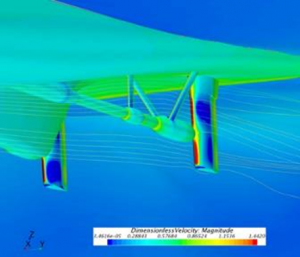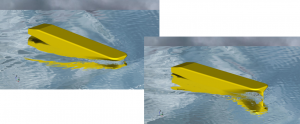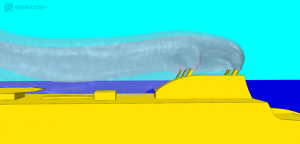Deltamarin has a long history in energy-efficient ship designs where hull form development has always been one of the spearheads. Nowadays, hull form and performance optimisation with computational fluid dynamics (CFD) is a standard procedure in Deltamarin’s ship projects. State-of-the-art tools combined with our vast experience enable us to optimise vessels for real operating conditions and to the ultimate level of efficiency.
Model testing is the traditional way of comparing different hull designs. Due to long experience of model basins, the test can give relatively accurate predictions of vessel performance. However, for an optimisation task, the model test approach is very heavy and does not always provide clear indications of the optimum design. In terms of cost and schedule, model testing is also not the most efficient way; additional tests and model modifications all cost money, and test slots must be booked months before the tests.
Model test evaluations are based on ITTC*-1957 or -1978 methods, in which the William Froude hypothesis is still applied to wave-making resistance. Froude’s hypothesis assumes that the coefficient of wave-making resistance is the same for similar hull forms in model scale and full scale at the same Froude number. In addition, each test basin uses its own experience-based correlation allowances to correct the model-scale result into a full-scale trial prediction.

Shaftline brackets optimisation
For powering prediction, this method is still very applicable, and the results are reliable. However, when it comes to optimising underwater appendages, the model test approach is not perfect. It is possible to perform model-scale experiments for optimising appendages, such as bow thruster openings, bilge keels and shaft lines, but it must be kept in mind that, due to the different boundary layers in model-scale and full-scale and complex scaling effects, the results are mainly indicative, and in some cases may even be incorrect.
The added value that we at Deltamarin want to offer our clients is to provide the most efficient ships by minimising operating costs, not only in normal trial conditions, but also taking into account the actual operation profile of the vessel. With today’s numerical tools, the vessel’s performance at different loading and environmental conditions can be calculated with reasonable ease. At Deltamarin, we believe that this should be self-evident in every ship project today.

RANS CFD simulation of hull in waves
The latest development and validation of CFD boost the efficiency of vessels. We are able to test innovations easily and rapidly with CFD, and our optimisation work reaches a highly detailed level. At Deltamarin, we use the state-of-the-art RANS CFD solver STAR-CCM+ and our own computer cluster to solve the flow field around the vessel. Moreover, to overcome the above-mentioned challenges in the scaling procedure, the CFD simulations can be done in full scale.
In addition to standard bare hull resistance simulations, we do simulations with detailed appendages and as a self-propulsion simulation. Shallow water effects and resistance in waves can also be studied and taken into account in the optimisation. All this allows us to optimise hull form and appendages to minimum propulsion power and the lowest possible fuel costs.

Aerodynamic calculations – smoke dispersion studies
CFD is very much an all-purpose tool for fluid flow. This opens up aerodynamics for us. Primary reported work is typically engine exhaust design, but issues related to air resistance, with or without wind, whether running forward or crabbing, can be understood better.
* International Towing Tank Conference
For more information, please contact

Manager, Concept Development
Tel. +358 2 4336 437
Mobile +358 40 1684 858
markus.vauhkonen@deltamarin.com







No comments yet.